CAIRO, Egypt — When fighting first broke out in Sudan’s capital, he only had $800 in his bank account.
As the sole provider for his family of five, high school teacher Shaheen al-Sharif knew that wasn’t enough to meet the rapidly rising price to escape, so he resolved to hunker down at his home in Khartoum.
“Going anywhere with that amount was not very feasible,” the 27-year-old told NBC News by phone last month.
Soon, an artillery shell had struck the roof and bullet marks scarred the outer walls as the intensifying conflict between Sudan’s army and a rival paramilitary group engulfed their neighborhood.
Heavy fighting has left hundreds of thousands of people facing the hellish decision of whether to flee the only country they’ve known as home, with cease-fires failing to stop the deadly battle for power that is fueling a growing humanitarian crisis.
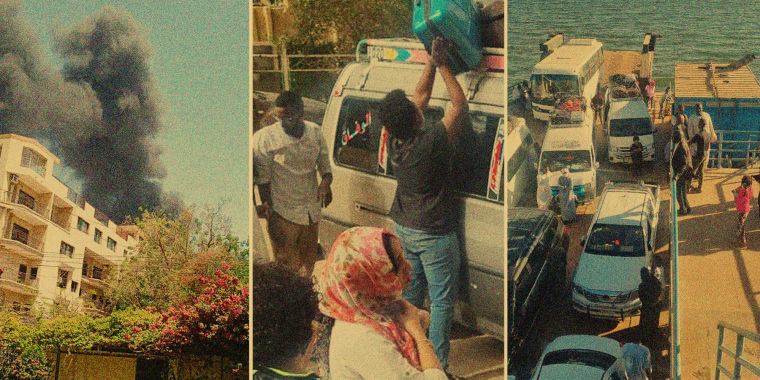
But al-Sharif had more pressing concerns: the hunt for insulin to keep his diabetic grandmother and his 12-year-old sister alive.
With no power, pharmacies empty and only enough insulin at home to last them less than a week in the sweltering heat, time was running out. By the ninth day of fighting, he told his family they had to go.
He managed to secure an additional $400 from a distant relative, enough for four seats on a bus to the border, with his sister, Talya, sitting on his aunt’s lap for the entire 18-hour ride.
“We realized that even if we’re going to be living in the streets, we need to get out. We cannot stay here any longer,” al-Sharif said last month from the border town of Wadi Halfa.
NBC News spoke to six Sudanese nationals who described a grueling and chaotic journey from their homes to neighboring Egypt, wracked by fear for their loved ones left in Sudan and doubt over whether they will ever be able to return to their old lives.
Unlike the thousands of foreign nationals from the United States and other countries who were whisked out in hectic evacuations, vast numbers of people from Khartoum and across Sudan have been forced to navigate their own paths to safety. That has meant dayslong and even weekslong journeys over land — and sometimes water — past military checkpoints and through heaving border crossings while short of money, basic essentials and medical necessities.
“It was the feeling that life is never going to be the same slowly creeping in and the realization that things might not return the same way it once was,” al-Sharif said, recounting how he felt on the long, last walk out of the neighborhood generations of his family had called home.
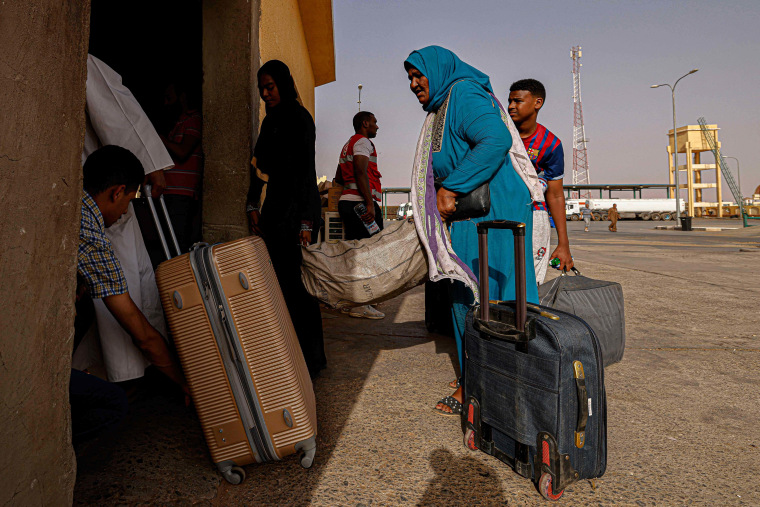
Inside Khartoum
Omnia Ahmed, 26, woke up early April 15 to the sound of the first shots outside her front door. Initially she was hopeful the fighting would subside quickly, but she said things became bleak once bullets flew through her mother’s bedroom and into a sofa.
“This is what really shook me,” she said. “She sits there on a daily basis.”
Ahmed, who had worked for the United Nations aid program in Sudan was not alone in her early optimism that the fighting would simmer down.
“We Sudanese always believe Khartoum is the safe haven,” Zaria Suleiman, 56, a mother of four who works in international development, said about the city she had called home for more than 25 years.
With a population of more than 5 million, Khartoum is not just Sudan’s capital and largest city, but also has long been considered a crucial economic, cultural and transportation hub that has largely escaped the sporadic conflicts focused in the west of the resource-rich country.
That is, until now.
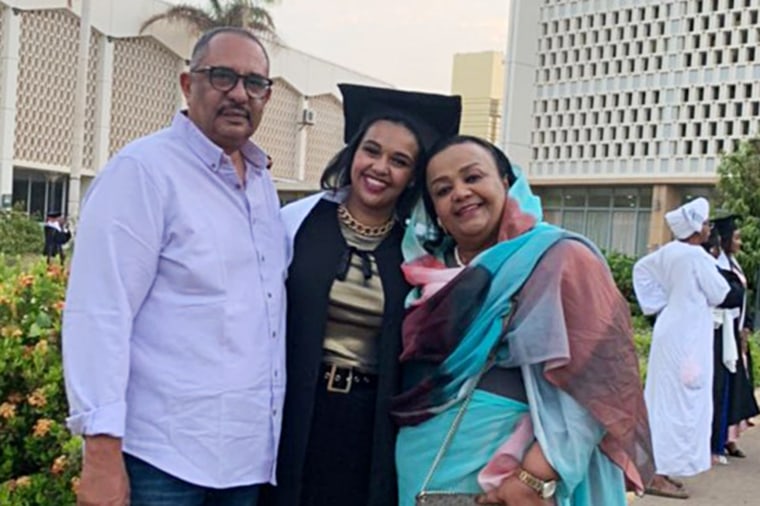
The blaring noise of airstrikes showering over Suleiman’s home felt paralyzing for her and her daughter, Amna, leading to sleepless nights. Stories of neighbors dying and friends missing began to circulate throughout their community in the north of the capital.
“It was the fear of our life,’” she said. “I would not sleep before seven o’clock in the morning out of fear that I will die in the middle of the night hit by a missile.”
Water, milk and other essentials in local stores began to run out. With electricity also hard to come by, families tried to ration what they could but some still joined a dangerous search for daily necessities.
“My heart would be beating that they might not come back,” Suleiman said of her husband and son’s trips in search of water.
She said she saw looters in her neighborhood ransacking homes and shops for sacks of flour, sugar or valuables left behind. Assuming the house was unoccupied, a looter came to her front door while she was still there, but ran away once her husband confronted him.
Others weren’t so lucky.
With neighborhoods divided up between the paramilitary Rapid Support Forces, or RSF, and the Sudanese military, civilians were often caught in the crossfire. Neighbors suffered bullet wounds as they tried to collect bread to break their fast during the Muslim holy month of Ramadan.
Despite the dire situation, many were reluctant to flee but ultimately, Ahmed said, “the decision was made for us.”
As Khartoum plunged deeper into violence, prompting the rest of the world to evacuate their citizens and close their embassies, Sudanese nationals scoured WhatsApp groups and meetings at local tea cafes as they searched for a way out.
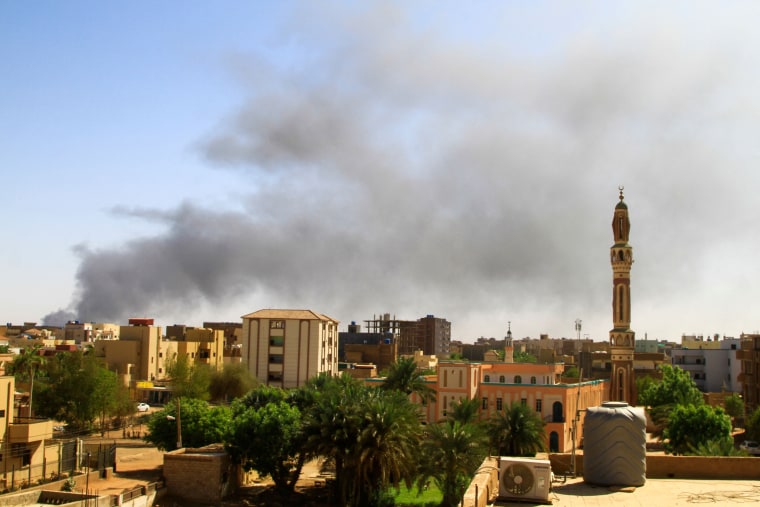
At times, just getting to the bus stop was a mission.
Heavy gunfire made opening the front door a danger, elderly family members were forced to carry luggage while walking with canes and children became distressed at the sudden upheaval.
“She was crying the whole way out about leaving our cat, about leaving the house, about potentially dying,” al-Sharif said of his sister.
Some had to leave loved ones.
“The fear of not seeing them again, you just don’t know,” Suleiman said, about leaving her husband and adult son behind to deal with some damage to their home.
Haphazard checkpoints dotting the city made every journey a potentially deadly gamble.
Ahmed said that as her grandmother fled her home for a safer location across the city, her caretaker was shot and “killed in the car seat next to her”’ by an RSF fighter.
While army checkpoints were seen as more “lenient” by locals, their locations and which faction was responsible for them was constantly changing. “There is no guarantee, it’s just your luck,” Suleiman said.
Initially, chartering a bus for 48 people cost around $15,000. Now fares have skyrocketed to more than $20,000, according to locals; An astronomical price that is out of reach for most people living in Sudan, where almost half of the population lives below the poverty line.
“The buses are like a rare commodity, so they would have an arrangement with you and then they would be negotiating with three or four other people to get a better price,” said Abdel-Rahman el-Mahdi, who runs a local nongovernmental organization. After a bus canceled on him, it took him seven days to eventually escape Sudan.
Border chaos
As Suleiman peered through her bus window on the drive out of Khartoum, she saw burned bodies and decimated factories. “It was a horrific scene,” she said.
Buses leaving Khartoum for Egypt must cross two bridges into a neighboring state before continuing 14 hours north. Usually stopping overnight for fuel, they then continue an eight-hour drive to either the Argeen border or Wadi Halfa, a parallel border crossing and small town on the other side of the Nile river.
Initially, most people opted for Argeen, the safer land crossing. But as it got more congested, thousands headed to Wadi Halfa, as well.
“I felt like I was a zoo animal,” Ahmed said, referring to the scenes at the Argeen border. “I just felt like everything has just been stripped away from me.”
Families like hers were forced to sleep for several nights on either side of the crossing. With no humanitarian groups present, those fleeing said there was no water, medical attention or bathrooms at the border as they gathered in the desert heat.
Some described seeing elderly people with no choice but to “do their business on themselves,” while others witnessed people dying due to pacemakers failing, dehydration or lack of insulin.
A shortage of workers and a complex visa process for Sudanese men between the ages of 16 and 49 forced families to split up, with some young men rerouted at the last moment.
“There were so many men who weren’t able to go through. I have never seen men so sad,” Suleiman recalled. “You’re already angry, you’re already broken,” she added.
Al-Sharif and his family had been sleeping on the floor of a mosque’s outdoor courtyard for several nights when he convinced them to leave him in Wadi Halfa and travel to Egypt, where there was better hope of medical attention or new supplies of insulin.
After crossing the border, it would take another six hours to reach Aswan, with his family having to cross the Nile by boat. Most families then try to find a way to Cairo or Alexandria, another 16-hour drive.
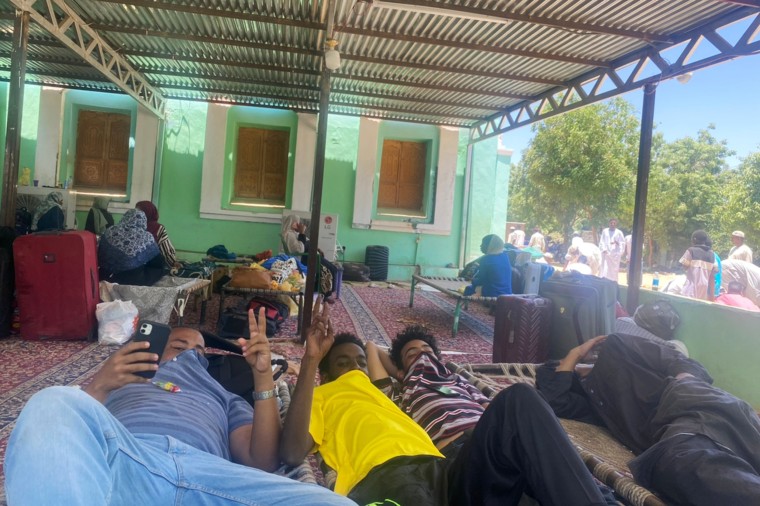
Like thousands of other young Sudanese men, al-Sharif was stuck there alone for three weeks and is now trying his luck at another crossing, Port Sudan.
Since the conflict first erupted, the border town has doubled in population, leaving young men sleeping on the streets as they await an Egyptian entry visa, with the backlog growing larger.
Suleiman and her husband made it to Cairo, Egypt’s bustling capital, but her son is still stuck in the border town. As she anxiously awaits news, the uncertainty over whether she will ever be able to return to Sudan has started to set in.
“This is my home. I don’t know where else is,” she said.
“Everything is just blown up in the air,” Suleiman added.
